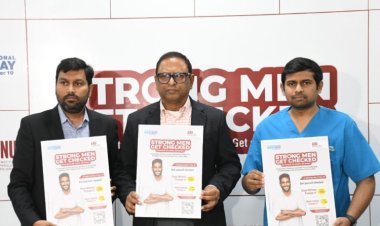India is in the era of post-Antibiotic Resistance Crisis

On the occasion of World Antibiotic Awareness Week, experts talk about drug resistance bacteria
Virtually all illnesses- from mild upper respiratory infection or urinary tract infection, GI infection caused by various different types of bacteria are showing increased resistance to prevalent antibiotics.
Resistance to antibiotics is growing at an alarming pace and we may soon see a day when we do not have antibiotics to treat certain infectious diseases. “This is because of indiscriminate and irresponsible use of antibiotics. Tuberculosis is a great example. We are now seeing significantly higher number of cases resistant to traditional drugs resulting in higher mortality and morbidity in tuberculosis. Over the counter sale of antibiotics must be banned completely. Doctors must pay greater attention while prescribing antibiotics and making sure the full dose and course is prescribed and complied by the patient,” says Dr Hari Prasad, CEO, central region of Apollo Hospitals.
According to Dr K K Aggarwal, National President Indian Medical Association (IMA) and President Heart Care Foundation of India (HCFI) and Dr RN Tandon – Honorary Secretary General IMA in a joint statement, said, “Antibiotic resistance is a growing concern and its impact on patients and communities is known to all. This is a public health problem, one which is rapidly spreading across the globe, with not enough resources to control it. Antibiotic resistance has made it harder for us to treat many infections such as typhoid, pneumonia, tuberculosis, and now gonorrhea. Antibiotic resistance prolongs hospitalization, and increases the cost of treatment and the risk of death.”
Many bacteria have developed resistance to commonly used antibiotics. Most worrisome of them being ESBL producing gram negative bacteria. Even typhoid bacteria have become resistant to some antibiotics which were earlier effective against them. “There is increase in antibiotic resistance being seen with Tb bacteria and HIV as well. All patients across all age groups are at risk of developing these drug resistant infections. However, elderly people, people who get hospitalised repeatedly, people with low immunity are at high risk of developing drug resistant infections,” Dr Hari Kishan Boorugu, Consultant Physician Apollo Hospitals.
Monitoring antibiotic prescriptions for seasonal illnesses like viral fevers/dengue etc- where there is no antibiotic need. People must be made aware of this as they have a role in prevention of evolution of drug resistant bugs. “Antibiotics are generally not required on first few days of any fever. Especially if viral fever is suspected. Because antibiotics work against bacteria and not virus. Even most bacterial infections are self limiting. The body immunity kills these bugs. Same is true for viral infections. Our Body naturally kills them. Overuse of antibiotics are to avoided. Patients (who demand) and doctors (in hurry to treat) will cause overuse or abuse of antibiotics,” says Dr. Sundeep Lakhtakia, MD, DNB, DM Consultant Gastroenterologist & Endosonologist, Asian Institute Of Gastroenterology.
Studies have shown that age may not be a considerable factor in determining antibiotic resistance. There is some evidence of resistant urinary tract infection being higher in females.
Resistance to antibiotics is growing at an alarming pace and we may soon see a day when we do not have antibiotics to treat certain infectious diseases. This is because of indiscriminate and irresponsible use of antibiotics. Tuberculosis is a great example. We are now seeing significantly higher number of cases resistant to traditional drugs resulting in higher mortality and morbidity in tuberculosis. Over the counter sale of antibiotics must be banned completely. Doctors must pay greater attention while prescribing antibiotics and making sure the full dose and course is prescribed and complied by the patient.
In India, several initiatives are under way to address the problem. A national antibiotic policy is being prepared which highlights about the hospitals incorporating into their guidelines. The government is urging hospitals to get accredited with the National Accreditation Board for Hospitals and Health Care Providers which will result in practices relating to judicious use of antibiotics. According to Dr Mahesh Joshi, CEO, Apollo Home healthcare, Hospitals /community acquired infections are also not responding to even the most high end antibiotics due to bugs like ESBL /MBL producing bacteria. Strict control on newer antibiotic introduction by Pharmaceutical companies –only be based on definitive evidence in significant sample size and in a reliable study.”
Using antibiotics in substandard doses and for inadequate duration can lead to development of antibiotic resistance. “We need to avoid unnecessary usage of antibiotics when not indicated. Inappropriate usage of antibiotics in veterinary medicine also is an important factor which contributes to development of antibiotic resistance. There are times when a doctor may not prescribe an antibiotic during initial phase of illness and may keep the patient with fever under the follow up and start antibiotics if required later on. People should not see this an incompetence as some patients express their displeasure and sometimes behave inappropriately saying their illness got prolonged because of delay in initiation of an antibiotic. People should understand that if we do not use antibiotics judiciously otherwise we may reach a stage where we antibiotics are ineffective due to development of resistance,” says Dr Hari Kishan.
Commonest cause of fever is viral fevers and they often don’t need antibiotics. “Since it is not always possible to diagnose the fever accurately, many doctors tend to give antibiotics for all fevers and patients also sometimes demand and put pressure on treating doctor to prescribe antibiotics! This problem (antibiotic resistance) not only increases the cost of therapy but is associated with increased morbidity and death risk. If we do not pay attention, we may soon go back to pre antibiotic era when people used to die of common infection due to lack of antibiotics! In India, many pharmacies sell antibiotics over the counter without a prescription. We need to involve both public and the medical professionals in helping bringing down antibiotic resistance,” explains Dr Hari Kishan.

 Disclaimer: Welthi.com does not guarantee any specific results as a result of the procedures mentioned here, and the results may vary from person to person.
Disclaimer: Welthi.com does not guarantee any specific results as a result of the procedures mentioned here, and the results may vary from person to person.









